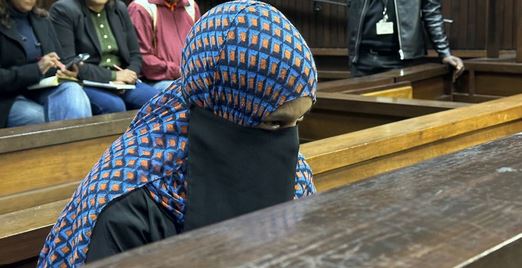The Bellville Magistrate’s Court has granted bail to Sameemah Jacobs, the woman accused of kidnapping infant Mogamat Imaad Sharmar, sparking emotional scenes inside and outside the courtroom.
Jacobs, who had been in custody since her arrest on 30 June, was released on bail of R4,000 following a judgment delivered by Magistrate Gcobani Ndaleni on Monday morning. As news of the court’s decision broke, the baby’s mother, Imaan Sharmar, broke down in tears. She was comforted by her aunt, Jennifer Hendricks, and had to be escorted from the courtroom by relatives, visibly too distraught to address the media.
Magistrate Ndaleni, explaining his rationale for the ruling, acknowledged the sensitive nature of the case but emphasised the legal framework within which such decisions are made.
“The release of an accused out on bail is not the question of guilt, that is for the trial to question,”
he stated, citing various legal precedents to reinforce the principle that bail does not equate to exoneration.
The magistrate pointed out that Jacobs, a first-time offender with no prior criminal record, was the primary caregiver to her three children, the youngest of whom is just seven years old. At the time of her detention, the children were placed under the care of a family friend, as Jacobs’s mother had been hospitalised.
The court was also informed that Jacobs had endured a miscarriage caused by an ectopic pregnancy and that she has been diagnosed with bipolar disorder. This medical history, along with her role as the children’s primary guardian, formed the cornerstone of the defence’s case for bail.
Jacobs, dressed in a pardah, was visibly emotional as the verdict was read. She wept quietly and wiped away tears while waving at her relatives seated in the public gallery, many of whom had not seen her since her arrest.
Despite the court’s decision, the matter is far from resolved. State prosecutor Salaahuddeen Simon confirmed that the investigation is ongoing, with crucial forensic evidence still outstanding. He requested that the case be postponed until 15 October to allow for further inquiry.
Outside the courtroom, emotions ran high. Civil society voices expressed deep concern over the implications of the ruling. Veranique “Benji” Williams of Faith and Hope Missing Persons organisation spoke passionately about the message such a judgment could send.
“What message is the courts sending out that everyone can kidnap a baby? What about the victims and the trauma that they will be suffering now that she is outside?”
While the State had argued that bail should be denied, citing the seriousness of the crime and its traumatic impact on the victim’s family, the magistrate ruled that they had not provided sufficient grounds to override Jacobs’s constitutional right to bail.
“The interest of the accused’s minor children must also be weighed,”
the magistrate stated, pointing out that they were in the temporary custody of a friend due to family health complications.
Sergeant Dawid Fortuin of the Serious and Violent Crimes Kidnapping Unit had testified during the bail hearing, highlighting both the nature of the allegations and Jacobs’s mental health struggles. The court was told that the accused had claimed through her legal representative to be her children’s primary caretaker, an assertion that was not challenged by the State.
Strict bail conditions have been imposed to mitigate concerns about interference. Jacobs is barred from visiting the Mitchells Plain and Strandfontein areas and prohibited from contacting any witnesses involved in the case.
Her family, while relieved by her release, refrained from speaking at length. A relative simply said they were “happy she was released” but offered no additional comments.
The baby’s family, meanwhile, continues to grapple with the emotional toll. The courtroom, filled with subdued tension, bore witness to a mother’s heartbreak and a community’s growing unease about the protection of children and the justice system’s ability to address their concerns.

















